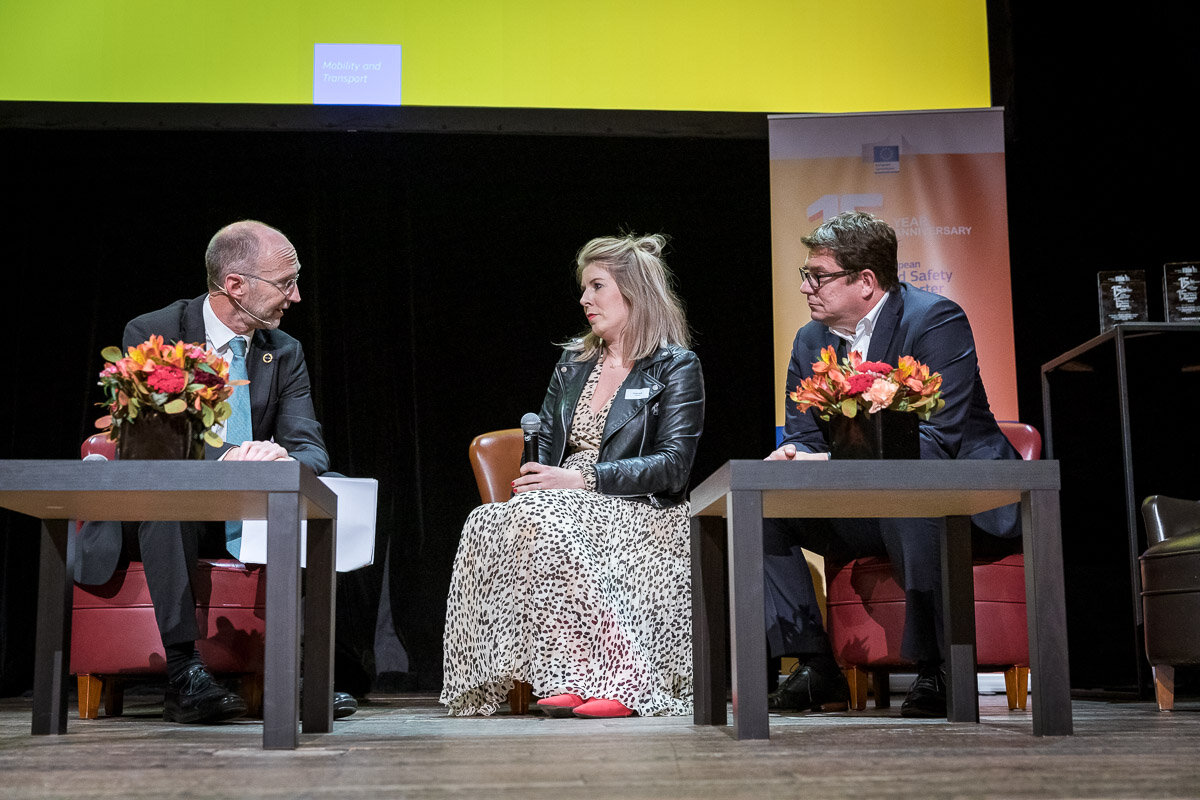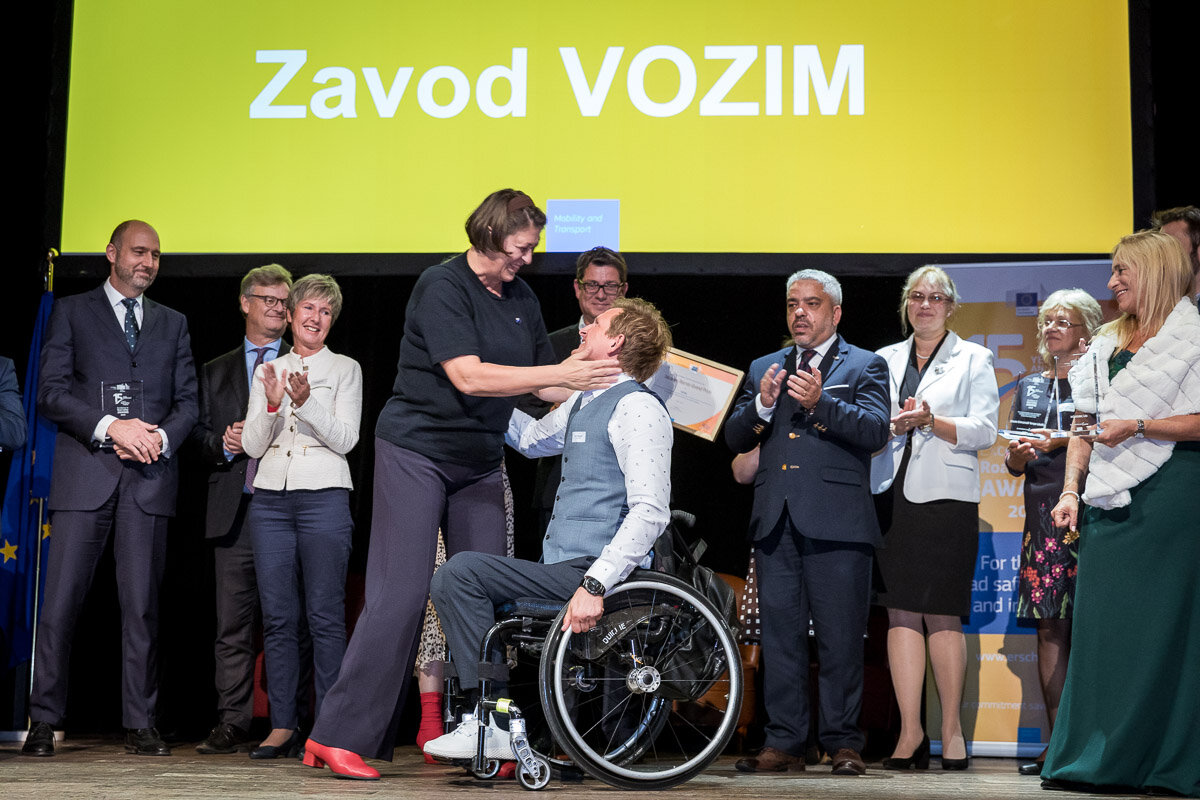Road Safety Charter celebrates best safety initiatives

date: 20/11/2019
The awards, announced on 9 October at the Vaudeville Theatre in Brussels, recognise road safety actions taken by civil society targeted at drivers, motorcyclists, university students and children.
The event marked 15 years since the Charter was created. Each of the six Road Safety Charter award winners was called onto the stage, where the host of the evening, DG MOVE Deputy Director General Matthew Baldwin described the winning projects and interviewed the project representatives.
The Automodus app by Dutch insurance company Interpolis won the large business category. A drink driving awareness campaign, by Portuguese consultancy InOutCister LDA, won the SME category.
The city council of Silly, Belgium won the authorities category while a quality label for motorcyclist training by the Association of European Motorcycle Constructors won in the voluntary commitments category.
The winner of the schools challenge for children up to 12 years was ‘Be smart when in traffic’ by the Şcoala Generală Tompa Laszlo in Odorheiu Secuiesc, Romania. The winner in the category for schoolchildren 12 and older was the road safety education programme by Fundación Mapfre, a non-profit organisation created by Spanish insurance company Mapfre.
Commissioner Bulc handed over the prizes. She said: ‘The awards bring only winners onto the stage, but every single project for road safety has an incredibly important role to play. It brings enormous satisfaction to see that the results of our work are so tangible.’
She called on everyone present to ensure that work to achieve Vision Zero continues unabated.
Jacques Barrot Prize
For the fourth consecutive year, a special prize dedicated to former Transport Commissioner Jacques Barrot was presented to one of the six Charter award winners. The audience chose the Jacques Barrot winner with an electronic voting device. This year, the Automodus app received the honour.
Speaking at the awards, Barrot’s widow Béatrice said the award was faithful to the idea of a Europe in service to its citizens, and to business and innovation, which Barrot had cherished.
She said he was passionate about actions such as the Charter and its awards because he was interested in results. ‘He only understood political action if it had a direct impact on people’s lives,’ she said. ‘Jacques loved just causes. He would be happy and proud to see you here to keep this flame alive. He would tell you with all the strength and energy of his European convictions that this fight for road safety must continue, that it must strengthen and develop.’
Jacques Barrot Grand Prix
 DG MOVE’s Director for Land Transport Elisabeth Werner interviewed the winners of the previous three Jacques Barrot awards: Lockerbie Academy, Scotland, which won in 2016; the Romanian Automobile Club in 2017; and the Slovenian ‘Heroes drive in pyjamas’ campaign by Zavod Vozim (I Drive), a safe driving education institute, in 2018.
DG MOVE’s Director for Land Transport Elisabeth Werner interviewed the winners of the previous three Jacques Barrot awards: Lockerbie Academy, Scotland, which won in 2016; the Romanian Automobile Club in 2017; and the Slovenian ‘Heroes drive in pyjamas’ campaign by Zavod Vozim (I Drive), a safe driving education institute, in 2018.
‘As former winners, you got the recognition of the audience for your work, passion and results, but you are also an inspiration for many others. It is important to understand why your initiative has a significant impact on road safety and how your initiatives benefit the rest of Europe as an inspiring good practice,’ said Werner.
The audience got to select the winner of the Jacques Barrot Grand Prix – the winner among the last four Jacques Barrot winners. The previous award winners were all assembled on stage. The tension was palpable as they waited for Commissioner Bulc to make the announcement. Zavod Vozim’s director David Razboršek exchanged high-fives with other people on stage when his organisation received the honour.
The European Road Safety Charter
This year marks the 15th anniversary of the creation of the European Road Safety Charter. It was signed in Dublin, Ireland in 2004, and is a European Commission-led civil society platform that aims to make Europe’s roads safer.
At present the platform has 4 225 members, including individuals, associations, NGOs, schools, municipalities, companies and driving schools. The European Federation of Road Traffic Victims was its first signatory.
Specifically, the Charter aims to encourage and support civil society to promote road safety in Europe, acknowledge their work in doing so, help its members learn about and share knowledge on road safety issues, and promote dialogue at all levels of governance in the EU.
The Charter is based on four principles: caring about road safety, taking action, supporting road safety policies, and sharing knowledge and experience.
